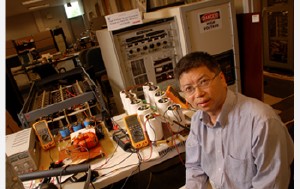Oct 6 2008
The National Science Foundation (NSF) announces the establishment of five new NSF Engineering Research Centers (ERCs) for the development of interdisciplinary research and education programs in partnership with industry. The NSF ERCs share the goal of advancing knowledge, technology, and innovations that address significant societal problems and provide the workforce and technical foundation for economic competitiveness. NSF will invest approximately $92.5 million in the centers over the next five years.
 Alex Q. Huang, Progress Energy Distinguished Professor in Electrical and Computer Engineering, will direct the new NSF Engineering Research Center for FREEDM Systems that will be headquartered at North Carolina State University. The center will investigate ways to integrate renewable energy sources into the nation's power grid. Credit: Roger Winstead, NC State University
Alex Q. Huang, Progress Energy Distinguished Professor in Electrical and Computer Engineering, will direct the new NSF Engineering Research Center for FREEDM Systems that will be headquartered at North Carolina State University. The center will investigate ways to integrate renewable energy sources into the nation's power grid. Credit: Roger Winstead, NC State University
Since 1985, the ERC program has fostered broad-based research and education collaborations among university and industry partners to focus on technological breakthroughs that lead to new products and services and on strengthening the capacity of U.S. engineering graduates to compete in global markets. The five centers launched this fall initiate a third generation of NSF ERCs that places increased emphasis on innovation and entrepreneurship, partnerships with small research firms and international collaboration and cultural exchange.
"The Gen-3 ERCs have been designed to build on the well-developed understanding laid down by the two previous generations of ERCs," says Lynn Preston, leader of NSF's ERC program. "We have added several new dimensions designed to speed the innovation process and prepare engineering graduates who are innovative, creative and understand how to function in a global economy where engineering talent is broadly distributed throughout the world. We expect these ERCs to make even more significant impacts on the competitiveness of U.S. industry than their predecessors."
Including the new awards, NSF supports 15 ERCs in the areas of biotechnology and health care; energy, sustainability and infrastructure; and microelectronics, sensing and information technology. Brief descriptions of the new centers follow.
- The NSF ERC for Biorenewable Chemicals (CBiRC), based at Iowa State University, seeks to transform the existing petrochemical-based chemical industry to one based on renewable materials.
- The NSF ERC for Future Renewable Electric Energy Delivery and Management (FREEDM) Systems, based at North Carolina State University, will conduct research to transform the nation's power grid into an efficient network that integrates alternative energy generation and new storage methods with existing power sources.
- The NSF ERC for Integrated Access Networks (CIAN), based at the University of Arizona, will conduct research to create transformative technologies for optical access networks that offer dramatically improved performance and expanded capabilities.
- The NSF ERC for Revolutionizing Metallic Biomaterials, based at North Carolina Agricultural and Technical State University, aims to transform current medial and surgical treatments by creating "smart" implants for craniofacial, dental, orthopedic and cardiovascular interventions.
- The NSF Smart Lighting ERC, based at Rensselaer Polytechnic Institute, aims to create new solid-state lighting technologies to enable rapid biological imaging, novel modes of communication, efficient displays and safer transportation.